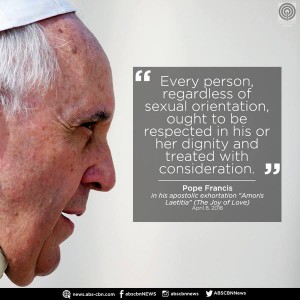As God’s chosen ones, holy and beloved, clothe yourselves with compassion, kindness, humility, meekness, and patience. [Colossians 3:12, NRSV]
Fr. Robert, a priest who serves in a parish in America, told a story at this year’s parish Lenten retreat.
One evening, he was contacted by a distraught mother whose son was dying. Sobbing over the phone, she said no priest would “come and do” the Sacrament of Anointing of the Sick for her son because he was gay and living in a conjugal partnership with another man. The other priests whom she had contacted had said her son was in a state of sin, that his lifestyle was inordinate and disordered, and that he was in a relationship that was marked by “intrinsic evil”. The sacraments of the Church could not be made available to him.
Fr. Robert agreed to visit the son.
When he got there, he found the distraught mother’s son in his sick bed, with his partner by his bedside. The man was clearly very sick, unable to move and in obvious great discomfort.
Fr. Robert took time to celebrate the sacrament of reconciliation commonly referred to as “Anointing of the Sick” in the company of a small community of faithful comprising a priest, a loving mother, a very sick gay person, and his faithful life partner. Afterwards, he chatted with the man’s partner. In that conversation, Fr. Robert, who was in the house on a personal mission of “pastoral” mercy, doing both spiritual and corporal works of mercy in a situation of severe “poverty” on account of dire needs, discovered for himself the depth and beauty of mercy in a truly loving human relationship. The partner described for the priest how the woman’s son had been steadily worsening over the last five years. When Fr. Robert asked why the partner had remained with the dying man, he replied, somewhat incredulously, “Because he’s my soulmate, my spouse… I love him!”
The report which we read did not elaborate. But we venture to imagine how Fr. Robert must have been inspired by that conversation to reflect on the beauty of human relationship in all its positive dimensions – love, fidelity, commitment, sacrifice. We can imagine him, a priest who is used to celebrating the marriage liturgy, pondering the marriage vow as he was driving home: “for better, for worse, for richer, for poorer, in sickness and in health, until death do us part.” The soft and gentle, but obstinate and sheer power of “Come what may, I will be with you” would be ringing in his ears like a haunting refrain, warming his heart and growing his faith in the mercy of God and the fundamental goodness of the human race that God has created.
At the parish retreat, the theme of which was “mercy” in this Jubilee Year, Fr. Robert pointed out to the participants that in that gay but very human relationship, he had the privilege to witness the purest and deepest example of conjugal love that he had ever encountered. He went on to say that he just could not believe that God would not be present in such a partnership every bit as much as He would be for a heterosexual couple.
We have for our instructions the many Gospel stories, even though they do not concern homosexual relationships, yet of which this contemporary parable is a reflection and in which the Lord affirms profound elements in human relationship. These elements include:
- Love and fidelity,
- Patience and commitment,
- Care and tenderness,
- Self-donating and sacrifice,
- Mercy and compassion.
“Love,” Pope Francis says, “opens our eyes and enables us to see, beyond all else, the great worth of a human being.” (Amoris Laetitia, 128)
Pastoral conversion in this light requires of us to repent of the use of a “mindlessly” harsh and condemnatory language on people whose relationships we consider “irregular”.
Evangelisation requires from us a spirit of love and patience, and a heart open to include and to welcome to the Table of the Lord people in the faith community who are different from ourselves.
Mercy requires of us a forgiving and generous spirit, one that is actively willing to be available to people who suffer.
Copyright © Dr. Jeffrey & Angie Goh, May 2016. All rights reserved.
You are most welcome to respond to this post. Email your comments to jeffangiegoh@gmail.com. You can also be dialogue partners in this Ephphatha Coffee-Corner Ministry by sending us questions for discussion.


